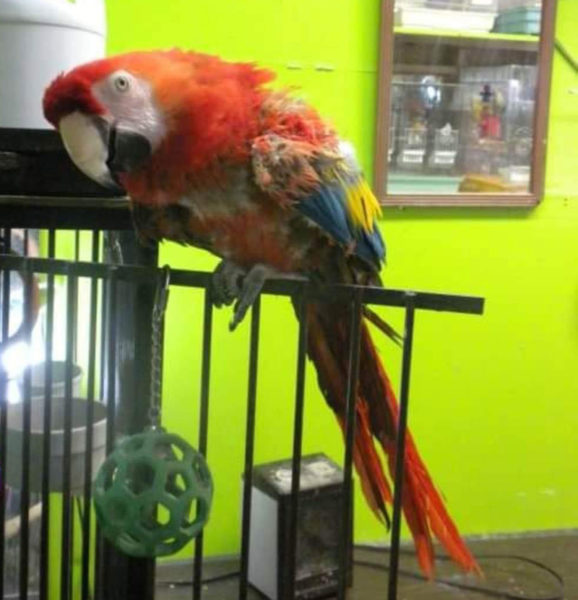
Scarlet the macaw, shown here at The Pet Center at Louis Doe Home Center in Newcastle, passed away this month after more than 40 years of welcoming visitors. Scarlett had an extensive vocabulary, knew her friends by name, and liked to dance, according to store owner Mark Doe, who grew up with her. (Courtesy photo)
After at least 40 years of greeting customers, Scarlet, the Louis Doe Pet Center’s resident macaw parrot, passed away from natural causes on May 15. She is remembered as an independent, smart bird dear to many who knew her as a longtime fixture of the Louis Doe Home Center in Newcastle.
Scarlet liked to dance, enjoyed getting reactions out of customers who came to see her, and had an extensive vocabulary, according to those who saw her every day in the store.
She was a central part of “the Newcastle zoo,” as owner Mark Doe said the pet shop is commonly called. His mother, Judy Doe, opened it within the home center in the early 1980s. Scarlet arrived by 1984.
Her exact age is uncertain. Sam Dobson, who has worked at the pet center for about eight years, said a former employee recalled her hatching in 1984, while veterinarian records have her closer to 50 years old.
A 1984 ad in The Lincoln County News offers a $25 savings bond reward for the child who submitted a winning name suggestion for the store’s new baby scarlet macaw.
“A lot of people come in just to see the bird,” Dobson said. Many regular visitors were in their 30s and remembered seeing her as children.
Doe said he grew up with her presence. Until her death, Scarlet would call his name across the store like his mother did.
The man and the bird had “a brother-and-sister relationship,” he said. She particularly enjoyed the company of his sisters and other women.
Along with a few shop cats, Scarlet was one resident of the pet center who never went for sale, following his mother’s wishes.
“Scarlet was more of the family than anything,” Doe said. “She just wasn’t for sale.”
Dobson said parrots typically have one person they like best, but can be very social. Scarlet, however, had a mind of her own.
“She was an independent bird,” Dobson said. “She did everything on her own terms.”
“She had her own personality,” Doe agreed.
He recalled looking into the bird room where she was eating from a plastic food storage crate:
“She’d look at you, back up, close the door, and go back to eating,” he said.
Dobson said she liked to get a reaction out of customers. Sometimes, when visitors tried to talk to her, she would stay quiet until they walked away, when she would say “Hello!”
Though she was a singular bird, she recognized people and called some of them by name. When former pet center employees came to visit, she would drop to the floor from her perch and come running across the floor to meet them, according to Doe.
“She recognized her friends and wanted to visit them,” he said.
Scarlet had a large vocabulary and some favorite words. Contractors working on the bird room years ago added “some colorful language” to her repertoire, Doe said, which she never gave up on using.
Some of her favorite everyday words were “apple,” “cracker,” and “hello,” according to Dobson.
“I think she knew a little more than she let on,” Dobson said. “I always wanted to video her when no one else was around to see what she was saying.”
She recalled warning Scarlet last winter that a heater on the counter was hot. She had never heard the bird use the word “hot” in seven years, she said, but Scarlet yelled it when she touched the heater.
Scarlet also liked to ride around the store on the shoulders of pet center employees, to whistle, and to dance.
“You’d stick your head in the pet room, and depending what was on the radio, she’d be there dancing up and down,” Doe said.
She loved country music and knew how to hum along to songs she liked.
Memories of Scarlet remain across the county in her feathers, which Dobson said children liked to pick up when she shed them.
“There’s a lot of kids around that probably have Scarlet’s feathers,” Dobson said.
One customer collected her loose down feathers for years to use in fly-fishing ties; he said they were the best because of their unusual colors.
Without her, “it’s a little bit more quiet in here these days,” Dobson said. The first thing she did when she came in every morning was to let the bird out.
“She was like the store mascot,” Dobson said.
Doe said he is not looking for another parrot to take her place, unless one comes along in need of a home.
“We would’ve loved to have her live longer,” he said.






